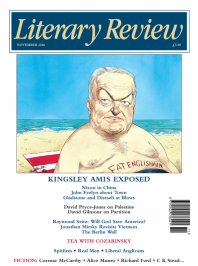Robert Fraser
A Scrum Too Far
The Arms of the Infinite
By Christopher Barker
Pomona 331pp £9.99
By the light of the log fire, the poet leant back. ‘You’ve met my sons, have you?’ he inquired in a husky drawl. ‘They all play rugby for England.’ This was two decades ago, and my mind drew a blank. The poet was George Barker (1913–91), and he was reputed to have fifteen children. Did they constitute a team? It seemed an uncomfortable prospect: The Barkers versus The World.
Ten years after his death, when my biography of Barker appeared, some facts had sorted themselves out. ‘Rugby for England’ had been schoolboy seven-a-side. The player sons were Christopher (1943– ), photographer and portraitist of poets, and Sebastian, himself a poet, now editor of the London Magazine. Both are products

Sign Up to our newsletter
Receive free articles, highlights from the archive, news, details of prizes, and much more.@Lit_Review
Follow Literary Review on Twitter
Twitter Feed
It wasn’t until 1825 that Pepys’s diary became available for the first time. How it was eventually decrypted and published is a story of subterfuge and duplicity.
Kate Loveman tells the tale.
Kate Loveman - Publishing Pepys
Kate Loveman: Publishing Pepys
literaryreview.co.uk
Arthur Christopher Benson was a pillar of the Edwardian establishment. He was supremely well connected. As his newly published diaries reveal, he was also riotously indiscreet.
Piers Brendon compares Benson’s journals to others from the 20th century.
Piers Brendon - Land of Dopes & Tories
Piers Brendon: Land of Dopes & Tories - The Benson Diaries: Selections from the Diary of Arthur Christopher Benson by Eamon Duffy & Ronald Hyam (edd)
literaryreview.co.uk
Of the siblings Gwen and Augustus John, it is Augustus who has commanded most attention from collectors and connoisseurs.
Was he really the finer artist, asks Tanya Harrod, or is it time Gwen emerged from her brother’s shadow?
Tanya Harrod - Cut from the Same Canvas
Tanya Harrod: Cut from the Same Canvas - Artists, Siblings, Visionaries: The Lives and Loves of Gwen and Augustus John by Judith Mackrell
literaryreview.co.uk